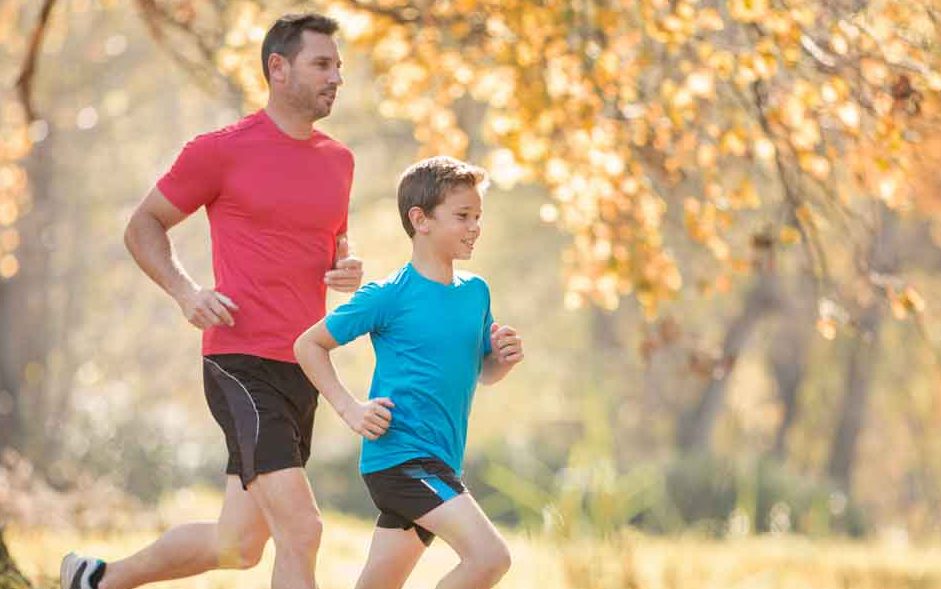Exercise as Social Skills Training for Kids with Autism

Make working out a daily routine if your child is on the autism spectrum. Research shows exercise may be great social skills training for children with autism.
Peggy, who has autism spectrum disorder, has a busy schedule for a child. She meets with a therapist specializing in applied behavioral analysis, and she sees a speech and occupational therapist. She’s busy almost every day after school.
Her parents work hard to make sure Peggy gets all the academic services she needs. The one thing that they overlooked is exercise.
“Physical activities are often the last thing that people focus on,” said Meghann Lloyd, associate professor of health sciences at the University of Ontario in Canada. “Parents emphasize that their children learn how to talk, make eye contact, sit still in class, and behave in social situations.”
YOU MIGHT ALSO LIKE: How to Get Children with Autism to Play
Lloyd recommends that children on the autism spectrum get active. She cited a study that shows exercise improves social skills, fine motor skills, communication, behavior, and performance on academic tasks.
The proof lies in how children play. When children play, they take turns, role play, and communicate verbally and nonverbally. Children enrolled in a variety of exercise programs — from aerobics to soccer to yoga — tend to be more cooperative and less combative.
Tara Markson enrolled her child in a basketball clinic. He’s on the autism spectrum and wanted to learn how to play. “We all understand the benefits of exercise and know that sitting can be harmful to our health,” she said. “My son’s pediatrician suggested he get some exercise in addition to all of the other counseling he receives. It’s true that most of the emphasis is placed on academics and not movement.”
Her son has Asperger’s syndrome. He sees a behaviorist and speech therapist twice a week. Even though his afterschool schedule is busy, Markson is pleased because she believes her son has become more confident thanks to basketball practice. He’s also made more friends.
Her son’s pediatrician told Markson that many kids with autism are delayed when it comes to running, skipping, hopping, and other motor skills. “My friends who have kids on the autism spectrum have told me that their kids tend to steer far away from sports because they don’t have the skills to play and fear they’ll be bullied.”
Many schools for children with special needs make gym a daily part of the day, and some after school programs offer sports classes for kids on the autism spectrum. “Through our PTO (Parent Teacher Organization), the parents have scheduled sports activities for the kids in our neighborhood with special needs,” Markson said.
Organizing events takes a bit of work, but Markson says it’s worth it: “To see your children running and laughing in a safe environment is what makes every parent and child happy.”
The children in these programs also lost weight. A report from the Centers for Disease Control and Prevention found that 32 percent of adolescents with autism are overweight.
Exercise can be introduced to children at all ages. Lloyd recommends that you start your child early. In addition to the social skills and other therapies, add exercise. If your child finds it overwhelming, start slowly. Break down the rules of the games into small steps.
When Markson’s son learned to play basketball, the coach broke the game down into sections. The kids learned how to throw, how to dribble a ball, how to pass a ball, and how to make a basket. “There was a lot of repetition,” she said. “We used a lot of small steps, and eventually my son got it.”
If your child’s school doesn’t have an afterschool program, talk to the principal, PTO members, and parents of kids in your child’s class. Find a gym or community center and ask if you can organize a once-a-week exercise workshop for children with autism. Then contact the parents of children in your child’s school and arrange a few dates to host a class.
You can pool together your money to pay an instructor. You can also arrange for play dates at a local park.
“I know a few parents who have done that,” said Markson. “It gets the kids outside. They’re having fun, socializing, and partaking in exercise.”
YOU MIGHT ALSO LIKE: Teaching Empathy to Children with Autism
Updated:
September 25, 2023
Reviewed By:
Janet O’Dell, RN